英文名著_百万英镑_En
- 格式:pdf
- 大小:101.64 KB
- 文档页数:16
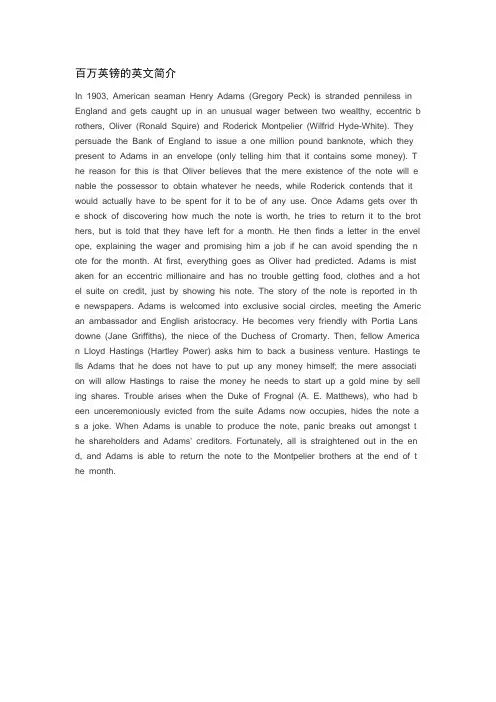
百万英镑的英文简介In 1903, American seaman Henry Adams (Gregory Peck) is stranded penniless in England and gets caught up in an unusual wager between two wealthy, eccentric b rothers, Oliver (Ronald Squire) and Roderick Montpelier (Wilfrid Hyde-White). They persuade the Bank of England to issue a one million pound banknote, which they present to Adams in an envelope (only telling him that it contains some money). T he reason for this is that Oliver believes that the mere existence of the note will e nable the possessor to obtain whatever he needs, while Roderick contends that it would actually have to be spent for it to be of any use. Once Adams gets over th e shock of discovering how much the note is worth, he tries to return it to the brot hers, but is told that they have left for a month. He then finds a letter in the envel ope, explaining the wager and promising him a job if he can avoid spending the n ote for the month. At first, everything goes as Oliver had predicted. Adams is mist aken for an eccentric millionaire and has no trouble getting food, clothes and a hot el suite on credit, just by showing his note. The story of the note is reported in th e newspapers. Adams is welcomed into exclusive social circles, meeting the Americ an ambassador and English aristocracy. He becomes very friendly with Portia Lans downe (Jane Griffiths), the niece of the Duchess of Cromarty. Then, fellow America n Lloyd Hastings (Hartley Power) asks him to back a business venture. Hastings te lls Adams that he does not have to put up any money himself; the mere associati on will allow Hastings to raise the money he needs to start up a gold mine by sell ing shares. Trouble arises when the Duke of Frognal (A. E. Matthews), who had b een unceremoniously evicted from the suite Adams now occupies, hides the note a s a joke. When Adams is unable to produce the note, panic breaks out amongst t he shareholders and Adams' creditors. Fortunately, all is straightened out in the en d, and Adams is able to return the note to the Montpelier brothers at the end of t he month.。

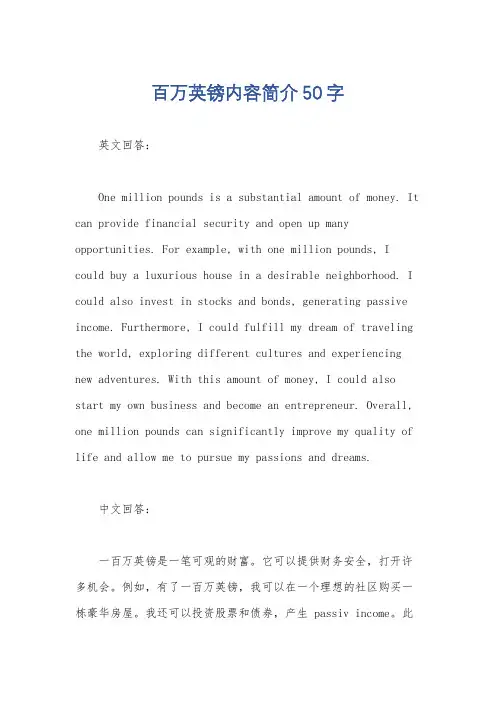
百万英镑内容简介50字英文回答:One million pounds is a substantial amount of money. It can provide financial security and open up many opportunities. For example, with one million pounds, I could buy a luxurious house in a desirable neighborhood. I could also invest in stocks and bonds, generating passive income. Furthermore, I could fulfill my dream of traveling the world, exploring different cultures and experiencing new adventures. With this amount of money, I could also start my own business and become an entrepreneur. Overall, one million pounds can significantly improve my quality of life and allow me to pursue my passions and dreams.中文回答:一百万英镑是一笔可观的财富。
它可以提供财务安全,打开许多机会。
例如,有了一百万英镑,我可以在一个理想的社区购买一栋豪华房屋。
我还可以投资股票和债券,产生 passiv income。
此外,我可以实现环游世界的梦想,探索不同的文化,体验新的冒险。
有了这笔钱,我还可以创业,成为一名企业家。
总的来说,一百万英镑可以显著提高我的生活质量,让我追求自己的激情和梦想。
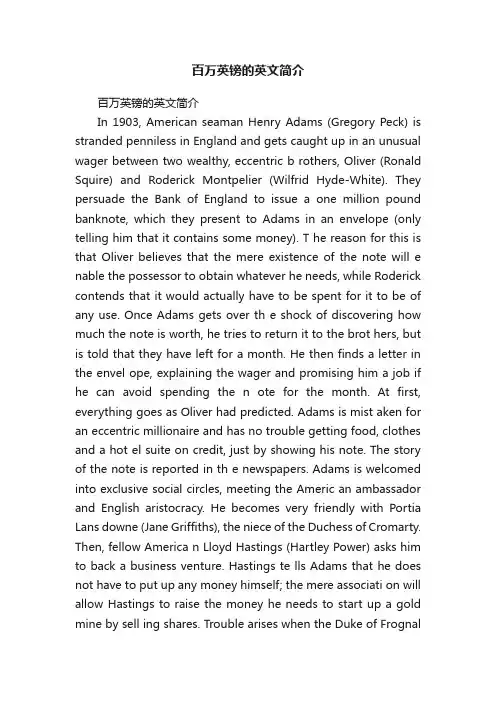
百万英镑的英文简介百万英镑的英文简介In 1903, American seaman Henry Adams (Gregory Peck) is stranded penniless in England and gets caught up in an unusual wager between two wealthy, eccentric b rothers, Oliver (Ronald Squire) and Roderick Montpelier (Wilfrid Hyde-White). They persuade the Bank of England to issue a one million pound banknote, which they present to Adams in an envelope (only telling him that it contains some money). T he reason for this is that Oliver believes that the mere existence of the note will e nable the possessor to obtain whatever he needs, while Roderick contends that it would actually have to be spent for it to be of any use. Once Adams gets over th e shock of discovering how much the note is worth, he tries to return it to the brot hers, but is told that they have left for a month. He then finds a letter in the envel ope, explaining the wager and promising him a job if he can avoid spending the n ote for the month. At first, everything goes as Oliver had predicted. Adams is mist aken for an eccentric millionaire and has no trouble getting food, clothes and a hot el suite on credit, just by showing his note. The story of the note is reported in th e newspapers. Adams is welcomed into exclusive social circles, meeting the Americ an ambassador and English aristocracy. He becomes very friendly with Portia Lans downe (Jane Griffiths), the niece of the Duchess of Cromarty. Then, fellow America n Lloyd Hastings (Hartley Power) asks him to back a business venture. Hastings te lls Adams that he does not have to put up any money himself; the mere associati on will allow Hastings to raise the money he needs to start up a gold mine by sell ing shares. Trouble arises when the Duke of Frognal(A. E. Matthews), who had b een unceremoniously evicted from the suite Adams now occupies, hides the note a s a joke. When Adams is unable to produce the note, panic breaks out amongst t he shareholders and Adams' creditors. Fortunately, all is straightened out in the en d, and Adams is able to return the note to the Montpelier brothers at the end of t he month.。
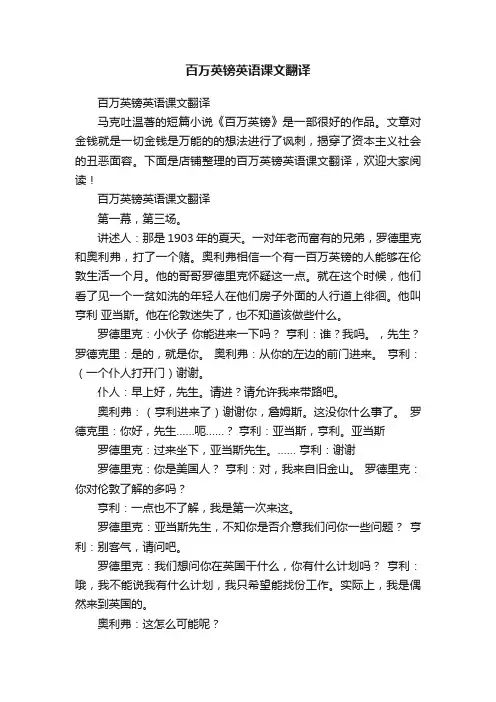
百万英镑英语课文翻译百万英镑英语课文翻译马克吐温著的短篇小说《百万英镑》是一部很好的作品。
文章对金钱就是一切金钱是万能的的想法进行了讽刺,揭穿了资本主义社会的丑恶面容。
下面是店铺整理的百万英镑英语课文翻译,欢迎大家阅读!百万英镑英语课文翻译第一幕,第三场。
讲述人:那是1903年的夏天。
一对年老而富有的兄弟,罗德里克和奥利弗,打了一个赌。
奥利弗相信一个有一百万英镑的人能够在伦敦生活一个月。
他的哥哥罗德里克怀疑这一点。
就在这个时候,他们看了见一个一贫如洗的年轻人在他们房子外面的人行道上徘徊。
他叫亨利亚当斯。
他在伦敦迷失了,也不知道该做些什么。
罗德里克:小伙子你能进来一下吗?亨利:谁?我吗。
,先生?罗德克里:是的,就是你。
奥利弗:从你的左边的前门进来。
亨利:(一个仆人打开门)谢谢。
仆人:早上好,先生。
请进?请允许我来带路吧。
奥利弗:(亨利进来了)谢谢你,詹姆斯。
这没你什么事了。
罗德克里:你好,先生……呃……?亨利:亚当斯,亨利。
亚当斯罗德里克:过来坐下,亚当斯先生。
…… 亨利:谢谢罗德里克:你是美国人?亨利:对,我来自旧金山。
罗德里克:你对伦敦了解的多吗?亨利:一点也不了解,我是第一次来这。
罗德里克:亚当斯先生,不知你是否介意我们问你一些问题?亨利:别客气,请问吧。
罗德里克:我们想问你在英国干什么,你有什么计划吗?亨利:哦,我不能说我有什么计划,我只希望能找份工作。
实际上,我是偶然来到英国的。
奥利弗:这怎么可能呢?亨利:哦,你知道,我在家里有一条自己的船。
大概一个月前,我正准备驶出海湾……奥利弗:哦,接着说。
亨利:好的,夜幕降至,我发现刮起了强烈的风,这都是我的错。
第二天早上,我还是迷失了方向,幸好有艘船发现了我。
奥利弗:那么就是那艘船带你来到英格兰了。
亨利:是的',事实上他们让我在船上帮工才免了我的船费,这就是我为什么会衣冠不整的原因了。
我去美国大使馆求助,但是……罗德里克:哦,你不必担心了,这也是你的优势。
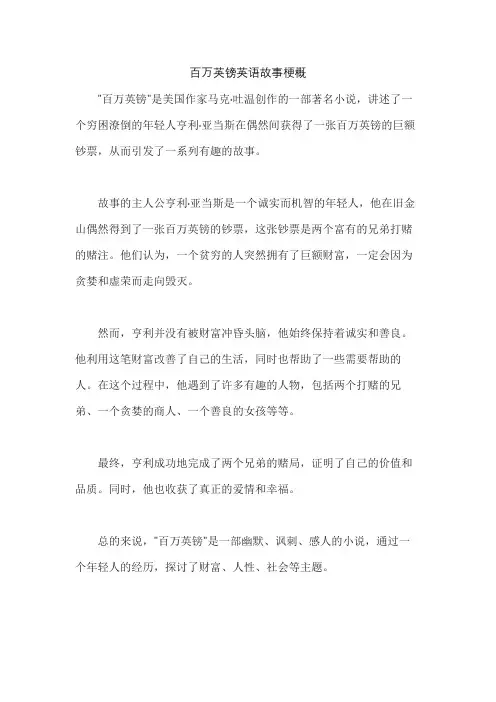
百万英镑英语故事梗概
"百万英镑"是美国作家马克·吐温创作的一部著名小说,讲述了一个穷困潦倒的年轻人亨利·亚当斯在偶然间获得了一张百万英镑的巨额钞票,从而引发了一系列有趣的故事。
故事的主人公亨利·亚当斯是一个诚实而机智的年轻人,他在旧金山偶然得到了一张百万英镑的钞票,这张钞票是两个富有的兄弟打赌的赌注。
他们认为,一个贫穷的人突然拥有了巨额财富,一定会因为贪婪和虚荣而走向毁灭。
然而,亨利并没有被财富冲昏头脑,他始终保持着诚实和善良。
他利用这笔财富改善了自己的生活,同时也帮助了一些需要帮助的人。
在这个过程中,他遇到了许多有趣的人物,包括两个打赌的兄弟、一个贪婪的商人、一个善良的女孩等等。
最终,亨利成功地完成了两个兄弟的赌局,证明了自己的价值和品质。
同时,他也收获了真正的爱情和幸福。
总的来说,"百万英镑"是一部幽默、讽刺、感人的小说,通过一个年轻人的经历,探讨了财富、人性、社会等主题。
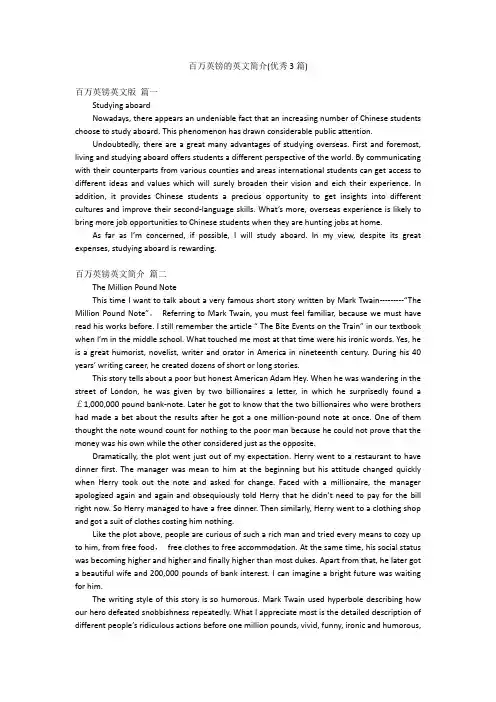
百万英镑的英文简介(优秀3篇)百万英镑英文版篇一Studying aboardNowadays, there appears an undeniable fact that an increasing number of Chinese students choose to study aboard. This phenomenon has drawn considerable public attention.Undoubtedly, there are a great many advantages of studying overseas. First and foremost, living and studying aboard offers students a different perspective of the world. By communicating with their counterparts from various counties and areas international students can get access to different ideas and values which will surely broaden their vision and eich their experience. In addition, it provides Chinese students a precious opportunity to get insights into different cultures and improve their second-language skills. What’s more, overseas experience is likely to bring more job opportunities to Chinese students when they are hunting jobs at home.As far as I’m concerned, if possible, I will study aboard. In my view, despite its great expenses, studying aboard is rewarding.百万英镑英文简介篇二The Million Pound NoteThis time I want to talk about a very famous short story written by Mark Twain---------“The Million Pound Note”。
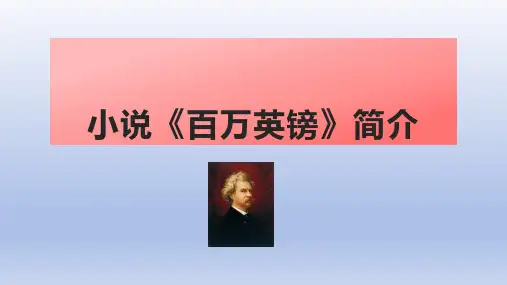
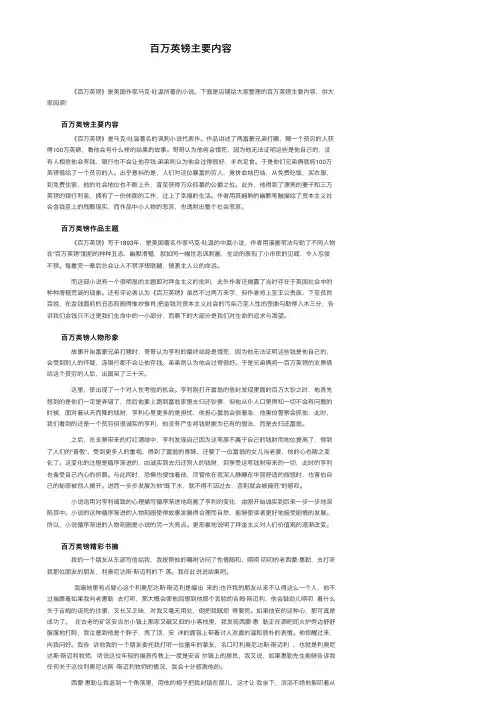
百万英镑主要内容 《百万英镑》是美国作家马克·吐温所著的⼩说。
下⾯是店铺给⼤家整理的百万英镑主要内容,供⼤家阅读! 百万英镑主要内容 《百万英镑》是马克·吐温著名的讽刺⼩说代表作。
作品讲述了两富豪兄弟打赌,赌⼀个贫穷的⼈获得100万英磅,看他会有什么样的结果的故事。
哥哥认为他将会饿死,因为他⽆法证明这些是他⾃⼰的,没有⼈相信他会有钱,银⾏也不会让他存钱;弟弟则认为他会过得很好,丰⾐⾜⾷。
于是他们兄弟俩就将100万英镑借给了⼀个贫穷的⼈。
出乎意料的是,⼈们对这位暴富的穷⼈,竟拼命地巴结,从免费吃饭,买⾐服,到免费住宿,他的社会地位也不断上升,直⾄获得万众仰慕的公爵之位。
此外,他得到了漂亮的妻⼦和三万英镑的银⾏利息,拥有了⼀份体⾯的⼯作,过上了幸福的⽣活。
作者⽤其娴熟的幽默笔触描绘了资本主义社会⾦钱⾄上的残酷现实,⽽作品中⼩⼈物的悲哀,也透射出整个社会悲哀。
百万英镑作品主题 《百万英镑》写于1893年,是美国著名作家马克·吐温的中篇⼩说,作者⽤漫画笔法勾勒了不同⼈物在“百万英镑”⾯前的种种丑态,幽默滑稽,就如同⼀幅世态讽刺画,⽣动的表现了⼩市民的见闻,令⼈忍俊不禁。
每看完⼀章后总会让⼈不禁浮想联翩,猜测主⼈公的命运。
⽽这部⼩说有⼀个很明显的主题即对拜⾦主义的批判,此外作者还揭露了当时存在于英国社会中的种种滑稽荒诞的现象。
还有评论者认为《百万英镑》虽然不过两万来字,但作者将上⾄王公贵族、下⾄贫民百姓,在⾦钱⾯前的丑态刻画得惟妙惟肖;把⾦钱对资本主义社会的污染乃⾄⼈性的歪曲勾勒得⼊⽊三分,告诉我们⾦钱只不过是我们⽣命中的⼀⼩部分,⽽剩下的⼤部分是我们对⽣命的追求与渴望。
百万英镑⼈物形象 故事开始富豪兄弟打赌时,哥哥认为亨利的最终结局是饿死,因为他⽆法证明这些钱是他⾃⼰的,会受到别⼈的怀疑,连银⾏都不会让他存钱。
弟弟则认为他会过得很好。
于是兄弟俩将⼀百万英镑的⽀票借给这个贫穷的⼈后,出国呆了三⼗天。
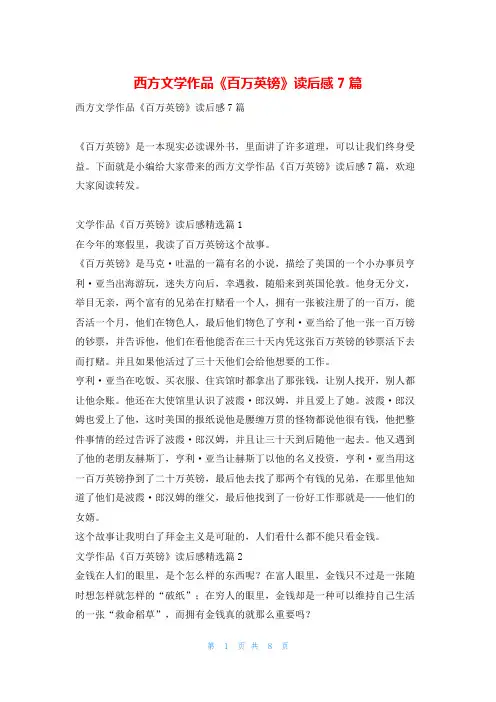
西方文学作品《百万英镑》读后感7篇西方文学作品《百万英镑》读后感7篇《百万英镑》是一本现实必读课外书,里面讲了许多道理,可以让我们终身受益。
下面就是小编给大家带来的西方文学作品《百万英镑》读后感7篇,欢迎大家阅读转发。
文学作品《百万英镑》读后感精选篇1在今年的寒假里,我读了百万英镑这个故事。
《百万英镑》是马克·吐温的一篇有名的小说,描绘了美国的一个小办事员亨利·亚当出海游玩,迷失方向后,幸遇救,随船来到英国伦敦。
他身无分文,举目无亲,两个富有的兄弟在打赌看一个人,拥有一张被注册了的一百万,能否活一个月,他们在物色人,最后他们物色了亨利·亚当给了他一张一百万镑的钞票,并告诉他,他们在看他能否在三十天内凭这张百万英镑的钞票活下去而打赌。
并且如果他活过了三十天他们会给他想要的工作。
亨利·亚当在吃饭、买衣服、住宾馆时都拿出了那张钱,让别人找开,别人都让他佘账。
他还在大使馆里认识了波霞·郎汉姆,并且爱上了她。
波霞·郎汉姆也爱上了他,这时美国的报纸说他是腰缠万贯的怪物都说他很有钱,他把整件事情的经过告诉了波霞·郎汉姆,并且让三十天到后随他一起去。
他又遇到了他的老朋友赫斯丁,亨利·亚当让赫斯丁以他的名义投资,亨利·亚当用这一百万英镑挣到了二十万英镑,最后他去找了那两个有钱的兄弟,在那里他知道了他们是波霞·郎汉姆的继父,最后他找到了一份好工作那就是——他们的女婿。
这个故事让我明白了拜金主义是可耻的,人们看什么都不能只看金钱。
文学作品《百万英镑》读后感精选篇2金钱在人们的眼里,是个怎么样的东西呢?在富人眼里,金钱只不过是一张随时想怎样就怎样的“破纸”;在穷人的眼里,金钱却是一种可以维持自己生活的一张“救命稻草”,而拥有金钱真的就那么重要吗?今天,读马克.吐温的短篇小说《百万英镑》,感慨万千。
小说写了美国的一个小办事员出海游玩,迷失了方向,幸好遇救。
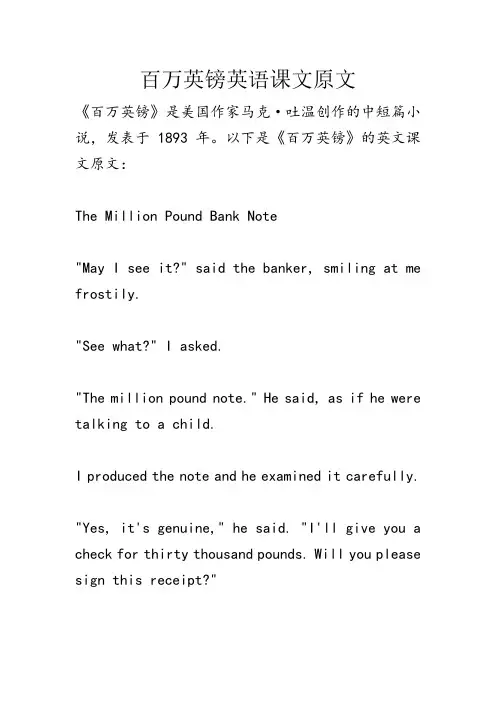
百万英镑英语课文原文《百万英镑》是美国作家马克·吐温创作的中短篇小说,发表于1893年。
以下是《百万英镑》的英文课文原文:The Million Pound Bank Note"May I see it?"said the banker,smiling at me frostily."See what?"I asked."The million pound note."He said,as if he were talking to a child.I produced the note and he examined it carefully."Yes,it's genuine,"he said."I'll give you a check for thirty thousand pounds.Will you please sign this receipt?"I signed the receipt and took the check.The banker备考眼镜,looking over the receipt carefully."Good,"he said,"This will do very nicely.Now, if you'll excuse me,I have a lot of work to do."I left the bank feeling a little dazed.I had never had so much money before.I could hardly believe that it was all mine.As I walked along the street,I saw a乞丐sitting on the sidewalk.He was a old man with a beard and a ragged coat.He looked very poor.I walked up to him and gave him the bank note."Here,"I said,"This is for you."The beggar looked at me in astonishment.He couldn't believe what I was doing."Why are you giving me this?"he asked."I just want to help you,"I said.The beggar thanked me and took the bank note.He looked at it carefully,as if he couldn't believe it was real."Thank you,"he said."You're a very kind man."I felt good about myself.I had done a good thing.As I walked away,I thought about the beggar.I wondered what he would do with the money.Would he buy food?Would he buy a new coat?Would he save it?I didn't know,but I hoped that the money would help him.。
百万英镑(美国作家马克·吐温著中篇小说)Millions of pounds (American writer Mark Twain, the novella)《百万英镑》是美国作家马克·吐温所著的小说。
讲述了一个穷困潦倒的办事员美国小伙子亨利·亚当斯在伦敦的一次奇遇。
伦敦的两位富翁兄弟打赌,把一张无法兑现的百万大钞借给亨利,看他在一个月内如何收场。
一个月的期限到了,亨利不仅没有饿死或被捕,反倒成了富翁,并且赢得了一位漂亮小姐的芳心。
文章以其略带夸张的艺术手法再现大师小说中讽刺与幽默,揭露了20世纪初英国社会的拜金主义思想,是马克·吐温作品精选中不可忽略的重要作品,是一部非常经典的短篇小说。
"Millions of pounds" is the American writer Mark Twain's novel. Tells the story of a poor clerk American boy Henry Adams in London a adventure. London's two billionaire brothers bet, lend an inability to millions of pounds to Henry, see him how it ended in a month. To a month, Henry didn't starve to death or arrested, but became a millionaire and won a beautiful young lady's heart. Based on its slightly exaggerated artistic representation master in the novel satire and humor, revealed at the beginning of the 20th century the British social ideas of materialism, is cannot be ignored in Mark Twain's works selected important work, is a very classic short stories.马克·吐温(1835—1910),美国作家,真实姓名是塞缪尔·兰霍恩·克莱门斯(或萨缪尔·兰亨·克莱门)。
百万英镑课文一、课文内容概括百万英镑是马克·吐温的一篇著名短篇小说。
故事讲述了一个穷困潦倒的美国小伙子亨利·亚当斯在伦敦的奇遇。
他意外地得到了一张百万英镑的大钞,这张大钞虽然无法直接使用,但却给他带来了意想不到的财富和地位。
亨利拿着这张大钞,起初在餐馆、服装店等地方遭遇了各种不同的待遇。
人们看到他衣衫褴褛却拿着百万英镑,态度从最初的轻视、怀疑到后来的阿谀奉承。
他凭借这张大钞的信誉,不仅免费获得了许多商品和服务,还成功地进入了上流社会,成为众人追捧的对象。
最后,他不仅收获了财富,还抱得美人归。
二、人物分析1. 亨利·亚当斯•他是一个诚实、善良且聪明的人。
尽管突然拥有了百万英镑,但他并没有被财富冲昏头脑。
在与各种人交往的过程中,他始终保持着自己的本性。
例如,在面对那些因为百万英镑而对他阿谀奉承的人时,他内心是清醒的,能够看透这些人的虚伪。
•他具有很强的适应能力。
从一个穷困的美国人到在伦敦上流社会如鱼得水,他能迅速适应环境的变化,利用自己的智慧在这个充满金钱诱惑的社会中生存。
2. 其他人物•那些在看到百万英镑前后态度发生巨大转变的商人、贵族等,他们代表了当时社会中以金钱为衡量标准的势利人群。
例如餐馆老板,在看到亨利拿出百万英镑之前,对他非常冷淡,甚至想要把他赶出去;而看到百万英镑之后,马上变得殷勤备至,提供最好的服务还不敢收钱。
三、主题探讨1. 金钱对人性的影响•小说深刻地揭示了金钱对人性的扭曲作用。
在故事中,人们对待亨利的态度完全取决于他是否拥有百万英镑这张大钞。
这表明在当时的社会,金钱成为了衡量一个人价值的唯一标准,人性中的善良、真诚被金钱所掩盖。
•同时,也通过亨利的形象展现了在金钱社会中保持自我的可贵。
尽管周围的人都被金钱迷惑,亨利却能在享受财富带来的便利的同时,不失去自己的本心。
2. 社会阶层与财富的关系•百万英镑成为了亨利进入上流社会的敲门砖。
在当时的英国社会,阶层划分明显,财富是跨越阶层的重要因素。
百万英镑的英文简介"Million Pound Bank Note" is a short story American author Mark Twain, first published in 1893. The story follows the adventures of a young man named Henry Adams, who arrives in London with nothing but a letter of introduction from a wealthy American. The letter instructs the recipient to provide Adams with a sum of one million pounds, with the stipulation that he not reveal his identity or seek employment.Upon receiving the money, Adams finds himself thrust into high society, where he is treated with respect and admiration due to the assumption that he is a wealthy aristocrat. He uses the money to live extravagantly, dining at the finest restaurants, purchasing luxurious clothes, and hiring a personal servant. However, as he begins to integrate intothis new lifestyle, he realizes that he is in over his head and must find a way to return the money before his true identity is discovered."Million Pound Bank Note" is a short story American author Mark Twain, first published in 1893. The story follows the adventures of a young man named Henry Adams, who arrives in London with nothing but a letter of introduction from a wealthy American. The letter instructs the recipient toprovide Adams with a sum of one million pounds, with the stipulation that he not reveal his identity or seek employment.Upon receiving the money, Adams finds himself thrust into high society, where he is treated with respect and admiration due to the assumption that he is a wealthy aristocrat. He uses the money to live extravagantly, dining at the finest restaurants, purchasing luxurious clothes, and hiring a personal servant. However, as he begins to integrate intothis new lifestyle, he realizes that he is in over his head and must find a way to return the money before his true identity is discovered.The story's protagonist, Henry Adams, is a relatable character who finds himself in an unexpected situation. Twain expertly crafts a narrative that keeps readers engaged and entertained, while also delivering a thoughtprovoking message about the importance of character and integrity in the face of wealth and social status.One of the most memorable aspects of the story is Twain's use of humor to highlight the absurdity of the social customs and expectations of the upper class. The protagonist's interactions with the wealthy and influential characters in the story are filled with wit and sarcasm, providing readerswith both laughter and insight into the societal norms of the time.In addition to its satirical elements, "Million PoundBank Note" also explores themes of identity and selfdiscovery. As Henry Adams navigates the world of the wealthy elite, he begins to question his own values and beliefs. The storyraises important questions about the nature of success and happiness, challenging readers to consider what truly matters in life."Million Pound Bank Note" is a short story Americanauthor Mark Twain, first published in 1893. The story follows the adventures of a young man named Henry Adams, who arrivesin London with nothing but a letter of introduction from a wealthy American. The letter instructs the recipient toprovide Adams with a sum of one million pounds, with the stipulation that he not reveal his identity or seek employment.Upon receiving the money, Adams finds himself thrust into high society, where he is treated with respect and admiration due to the assumption that he is a wealthy aristocrat. Heuses the money to live extravagantly, dining at the finest restaurants, purchasing luxurious clothes, and hiring a personal servant. However, as he begins to integrate intothis new lifestyle, he realizes that he is in over his headand must find a way to return the money before his trueidentity is discovered.The story's protagonist, Henry Adams, is a relatable character who finds himself in an unexpected situation. Twain expertly crafts a narrative that keeps readers engaged and entertained, while also delivering a thoughtprovoking message about the importance of character and integrity in the faceof wealth and social status.One of the most memorable aspects of the story is Twain's use of humor to highlight the absurdity of the social customs and expectations of the upper class. The protagonist's interactions with the wealthy and influential characters inthe story are filled with wit and sarcasm, providing readers with both laughter and insight into the societal norms of the time.In addition to its satirical elements, "Million PoundBank Note" also explores themes of identity and selfdiscovery. As Henry Adams navigates the world of the wealthy elite, he begins to question his own values and beliefs. The storyraises important questions about the nature of success and happiness, challenging readers to consider what truly matters in life."Million Pound Bank Note" also offers a critique of the materialistic values that often define success in society.Twain suggests that true happiness and fulfillment cannot be found in wealth alone, but rather in one's character and relationships with others.Furthermore, the story's setting in Victorian England provides a rich backdrop for Twain's exploration of social issues. The rigid class structure and the emphasis on social status serve as a microcosm for the broader themes of the story, allowing readers to reflect on their own values and the ways in which they are influenced societal expectations.In conclusion, "Million Pound Bank Note" is a captivating and thoughtprovoking work of literature that offers readers a humorous and insightful look into the nature of wealth,social status, and personal identity. Twain's skillful storytelling and satirical wit make it a classic that continues to resonate with readers today.。
介绍小说《百万英镑》高一英语作文介绍小说《百万英镑》高一英语作文在平日的学习、工作和生活里,大家都经常接触到作文吧,借助作文人们可以实现文化交流的目的。
那么,怎么去写作文呢?下面是小编帮大家整理的介绍小说《百万英镑》高一英语作文,仅供参考,希望能够帮助到大家。
A pair of brothers received a letter which gave him a million pounds.It turned out that the brothers made a bet, bet if a poor, honest man fall from the sky received one million pounds, he will have what results?Brother that he would starve to death because he could not prove the money was his own, someone else will be suspected, even banks will not allow him to save money.Brother believes that he will very well, so they brothers will check for one million pounds lent the poor, and abroad spent thirty days.I did not expect at this time, people who suddenly rich riches rare, hard to actually draw him from the free food, buy clothes, to free accommodation, one by one like a beggar, like to please him, and continue to improve his social position, until the outdoor addition to the king on top of Duke!Not only that, he got a good wife and thirty thousand pounds of bank interest.Since then lived very, very happy life.See here, I am so envious of the "lucky" the hero, but I want to: The reason why people please him, not because it was too much focus on money yet?Worship of money is shameful, something for nothing we should not!Money is not everything in the world there are many more important things than money.Article on the "money is everything" "Money is omnipotent," the idea for a satire and expose the ugly face of capitalist society and the rule of darkness.拓展:《百万英镑》读后感寒假,我读了《百万英镑》这本书,使我明白了更多金钱的意义。
The Million Pound NoteWhen I was twenty-seven years old, I was a mining-broker's clerk in San Francisco, and an expert in all the details of stock traffic. I was alone in the world, and had nothing to depend upon but my wits and a clean reputation; but these were setting my feet in the road to eventual fortune, and I was content with the prospect.My time was my own after the afternoon board, Saturdays, and I was accustomed to put it in on a little sail-boat on the bay. One day I ventured too far, and was carried out to sea. Just at nightfall, when hope was about gone, I was picked up by a small brig which was bound for London. It was a long and stormy voyage, and they made me work my passage without pay, as a common sailor. When I stepped ashore in London my clothes were ragged and shabby, and I had only a dollar in my pocket. This money fed and sheltered me twenty-four hours. During the next twenty-four I went without food and shelter.About ten o'clock on the following morning, seedy and hungry, I was dragging myself along Portland Place, when a child that was passing, towed by a nurse-maid, tossed a luscious big pear—minus one bite—into the gutter. I stopped, of course, and fastened my desiring eye on that muddy treasure. My mouth watered for it, my stomach craved it, my whole being begged for it. But every time I made a move to get it some passing eye detected my purpose, and of course I straightened up then, and looked indifferent, and pretended that I hadn't been thinking about the pear at all. This same thing kept happening and happening, and I couldn't get the pear. I was just getting desperate enough to brave all the shame, and to seize it, when a window behind me was raised, and a gentleman spoke out of it, saying:"Step in here, please."I was admitted by a gorgeous flunkey, and shown into a sumptuous room where a couple of elderly gentlemen were sitting. They sent away the servant, and made me sit down. They had just finished their breakfast, and the sight of the remains of it almost overpowered me. I could hardly keep my wits together in thepresence of that food, but as I was not asked to sample it, I had to bear my trouble as best I could.Now, something had been happening there a little before, which I did not know anything about until a good many days afterwards, but I will tell you about it now. Those two old brothers had been having a pretty hot argument a couple of days before, and had ended by agreeing to decide it by a bet, which is the English way of settling everything.You will remember that the Bank of England once issued two notes of a million pounds each, to be used for a special purpose connected with some public transaction with a foreign country. For some reason or other only one of these had been used and canceled; the other still lay in the vaults of the Bank. Well, the brothers, chatting along, happened to get to wondering what might be the fate of a perfectly honest and intelligent stranger who should be turned adrift in London without a friend, and with no money but that million-pound bank-note, and no way to account for his being in possession of it. Brother A said he would starve to death; Brother B said he wouldn't. Brother A said he couldn't offer it at a bank or anywhere else, because he would be arrested on the spot. So they went on disputing till Brother B said he would bet twenty thousand pounds that the man would live thirty days, anyway, on that million, and keep out of jail, too. Brother A took him up. Brother B went down to the Bank and bought that note. Just like an Englishman, you see; pluck to the backbone. Then he dictated a letter, which one of his clerks wrote out in a beautiful round hand, and then the two brothers sat at the window a whole day watching for the right man to give it to.I would have picked up the pear now and eaten it before all the world, but it was gone; so I had lost that by this unlucky business, and the thought of it did not soften my feeling towards those men. As soon as I was out of sight of that house I opened my envelope, and saw that it contained money! My opinion of those people changed, I can tell you! I lost not a moment, but shoved note and money into my vest pocket, and broke for the nearest cheap eating house. Well, how I did eat! When at last I couldn't hold any more, I took out my money and unfolded it, took one glimpseand nearly fainted. Five millions of dollars! Why, it made my head swim.I must have sat there stunned and blinking at the note as much as a minute before I came rightly to myself again. The first thing I noticed, then, was the landlord. His eye was on the note, and he was petrified. He was worshiping, with all his body and soul, but he looked as if he couldn't stir hand or foot. I took my cue in a moment, and did the only rational thing there was to do. I reached the note towards him, and said, carelessly:"Give me the change, please."Then he was restored to his normal condition, and made a thousand apologies for not being able to break the bill, and I couldn't get him to touch it. He wanted to look at it, and keep on looking at it; he couldn't seem to get enough of it to quench the thirst of his eye, but he shrank from touching it as if it had been something too sacred for poor common clay to handle. I said:"I am sorry if it is an inconvenience, but I must insist. Please change it; I haven't anything else."But he said that wasn't any matter; he was quite willing to let the trifle stand over till another time. I said I might not be in his neighborhood again for a good while; but he said it was of no consequence, he could wait, and, moreover, I could have anything I wanted, any time I chose, and let the account run as long as I pleased. He said he hoped he wasn't afraid to trust as rich a gentleman as I was, merely because I was of a merry disposition, and chose to play larks on the public in the matter of dress. By this time another customer was entering, and the landlord hinted to me to put the monster out of sight; then he bowed me all the way to the door, and I started straight for that house and those brothers, to correct the mistake which had been made before the police should hunt me up, and help me do it. I was pretty nervous; in fact, pretty badly frightened, though, of course, I was no way in fault; but I knew men well enough to know that when they find they've given a tramp a million-pound bill when they thought it was a one-pounder, they are in a frantic rage against him instead of quarreling with their own near-sightedness,as they ought. As I approached the house my excitement began to abate, for all was quiet there, which made me feel pretty sure the blunder was not discovered yet. I rang. The same servant appeared. I asked for those gentlemen."They are gone." This in the lofty, cold way of that fellow's tribe."Gone? Gone where?""On a journey.""But whereabouts?""To the Continent, I think.""The Continent?""Yes, sir.""Which way—by what route?""I can't say, sir."Maybe those men mean me well, maybe they mean me ill; no way to decide that—let it go. They've got a game, or a scheme, or an experiment, of some kind on hand; no way to determine what it is—let it go. There's a bet on me; no way to find out what it is—let it go. That disposes of the indeterminable quantities; the remainder of the matter is tangible, solid, and may be classed and labeled with certainty. If I ask the Bank of England to place this bill to the credit of the man it belongs to, they'll do it, for they know him, although I don't; but they will ask me how I came in possession of it, and if I tell the truth, they'll put me in the asylum, naturally, and a lie will land me in jail. The same result would follow if I tried to bank the bill anywhere or to borrow money on it. I have got to carry this immense burden around until those men come back, whether I want to or not. It is useless to me, as useless as a handful of ashes, and yet I must take care of it, and watch over it, while I beg my living. I couldn't give it away, if I should try, for neither honest citizen nor highwayman would accept it or meddle with it for anything. Those brothers are safe. Even if I lose their bill, or burn it, they are still safe, because they can stop payment, and the Bank will make them whole; but meantime I've got to do a month'ssuffering without wages or profit—unless I help win that bet, whatever it may be, and get that situation that I am promised.I should like to get that; men of their sort have situations in their gift that are worth having.I got to thinking a good deal about that situation. My hopes began to rise high. Without doubt the salary would be large. It would begin in a month; after that I should be all right. Pretty soon I was feeling first- rate. By this time I was tramping the streets again. The sight of a tailor-shop gave me a sharp longing to shed my rags, and to clothe myself decently once more. Could I afford it? No; I had nothing in the world but a million pounds. So I forced myself to go on by. But soon I was drifting back again. The temptation persecuted me cruelly. I must have passed that shop back and forth six times during that manful struggle. At last I gave in; I had to. I asked if they had a misfit suit that had been thrown on their hands. The fellow I spoke to nodded his head towards another fellow, and gave me no answer. I went to the indicated fellow, and he indicated another fellow with his head, and no words. I went to him, and he said:"Tend to you presently."I waited till he was done with what he was at, then he took me into a back room, and overhauled a pile of rejected suits, and selected the rattiest one for me. I put it on. It didn't fit, and wasn't in any way attractive, but it was new, and I was anxious to have it; so I didn't find any fault, but said, with some diffidence:"It would be an accommodation to me if you could wait some days for the money. I haven't any small change about me."The fellow worked up a most sarcastic expression of countenance, and said:"Oh, you haven't? Well, of course, I didn't expect it. I'd only expect gentlemen like you to carry large change."I was nettled, and said:"My friend, you shouldn't judge a stranger always by the clothes he wears. I am quite able to pay for this suit; I simply didn't wish to put you to the trouble of changing a large note."The proprietor took a look, gave a low, eloquent whistle, then made a dive for the pile of rejected clothing, and began to snatch it this way and that, talking all the time excitedly, and as if to himself:"Sell an eccentric millionaire such an unspeakable suit as that! Tod's a fool—a born fool. Always doing something like this. Drives every millionaire away from this place, because he can't tell a millionaire from a tramp, and never could. Ah, here's the thing I am after. Please get those things off, sir, and throw them in the fire. Do me the favor to put on this shirt and this suit; it's just the thing, the very thing—plain, rich, modest, and just ducally nobby; made to order for a foreign prince—you may know him, sir, his Serene Highness the Hospodar of Halifax; had to leave it with us and take a mourning-suit because his mother was going to die— which she didn't. But that's all right; we can't always have things the way we—that is, the way they—there! trousers all right, they fit you to a charm, sir; now the waistcoat; aha, right again! now the coat—lord! Look at that, now! Perfect—the whole thing! I never saw such a triumph in all my experience."I expressed my satisfaction."Quite right, sir, quite right; it'll do for a makeshift, I'm bound to say. But wait till you see what we'll get up for you on your own measure. Come, Tod, book and pen; get at it. Length of leg, 32"—and so on. Before I could get in a word he had measured me, and was giving orders for dress-suits, morning suits, shirts, and all sorts of things. When I got a chance I said:"But, my dear sir, I can't give these orders, unless you can wait indefinitely, or change the bill.""Indefinitely! It's a weak word, sir, a weak word. Eternally—that's the word, sir. Tod, rush these things through, and send them to the gentleman's address without any waste of time. Let the minor customers wait. Set down the gentleman's address and—""I'm changing my quarters. I will drop in and leave the new address.""Quite right, sir, quite right. One moment—let me show you out, sir. There—good day, sir, good day."Well, don't you see what was bound to happen? I drifted naturally into buying whatever I wanted, and asking for change. Within a week I was sumptuously equipped with all needful comforts and luxuries, and was housed in an expensive private hotel in Hanover Square. I took my dinners there, but for breakfast I stuck by Harris's humble feeding house, where I had got my first meal on my million-pound bill. I was the making of Harris. The fact had gone all abroad that the foreign crank who carriedmillion-pound bills in his vest pocket was the patron saint of the place. That was enough. From being a poor, struggling, little hand-to-mouth enterprise, it had become celebrated, and overcrowded with customers. Harris was so grateful that he forced loans upon me, and would not be denied; and so, pauper as I was, I had money to spend, and was living like the rich and the great.I judged that there was going to be a crash by and by, but I was in now and must swim across or drown. You see there was just that element of impending disaster to give a serious side, a sober side, yes, a tragic side, to a state of things which would otherwise have been purely ridiculous. In the night, in the dark, the tragedy part was always to the front, and always warning, always threatening; and so I moaned and tossed, and sleep was hard to find. But in the cheerful daylight the tragedy element faded out and disappeared, and I walked on air, and was happy to giddiness, to intoxication, you may say.You know, I even kept my old suit of rags, and every now and then appeared in them, so as to have the old pleasure of buying trifles, and being insulted, and then shooting the scoffer dead with the million- pound bill. But I couldn't keep that up. The illustrated papers made the outfit so familiar that when I went out in it I was at once recognized and followed by a crowd, and if I attempted a purchase the man would offer me his whole shop on credit before I could pull my note on him.About the tenth day of my fame I went to fulfil my duty to my flag by paying my respects to the American minister. He received me with the enthusiasm proper in my case, upbraided me for being so tardy in my duty, and said that there was only one way to gethis forgiveness, and that was to take the seat at his dinner-party that night made vacant by the illness of one of his guests. I said I would, and we got to talking. It turned out that he and my father had been schoolmates in boyhood, Yale students together later, and always warm friends up to my father's death. So then he required me to put in at his house all the odd time I might have to spare, and I was very willing, of course.In fact, I was more than willing; I was glad. When the crash should come, he might somehow be able to save me from total destruction; I didn't know how, but he might think of a way, maybe.I couldn't venture to unbosom myself to him at this late date,a thing which I would have been quick to do in the beginning of this awful career of mine in London. No, I couldn't venture it now; I was in too deep; that is, too deep for me to be risking revelations to so new a friend, though not clear beyond my depth, as I looked at it. Because, you see, with all my borrowing, I was carefully keeping within my means—I mean within my salary. Of course, I couldn't know what my salary was going to be, but I had a good enough basis for an estimate in the fact, that if I won the bet I was to have choice of any situation in that rich old gentleman's gift provided I was competent—and I should certainly prove competent; I hadn't any doubt about that. And as to the bet, I wasn't worrying about that; I had always been lucky. Now my estimate of the salary was six hundred to a thousand a year; say, six hundred for the first year, and so on up year by year, till I struck the upper figure by proved merit. At present I was only in debt for my first year's salary. Everybody had been trying to lend me money, but I had fought off the most of them on one pretext or another; so this indebtedness represented only£300 borrowed money, the other £300 represented my keep and my purchases. I believed my second year's salary would carry me through the rest of the month if I went on being cautious and economical, and I intended to look sharply out for that. My month ended, my employer back from his journey, I should be all right once more, for I should at once divide the two years' salary among my creditors by assignment, and get right down to my work. It was a lovely dinner-party of fourteen. The Duke and Duchess of Shoreditch, and their daughter the LadyAnne-Grace-Eleanor-Celeste-and-so-forth-and-so-forth-de-Bohun, the Earl and Countess of Newgate, Viscount Cheapside, Lord and Lady Blatherskite, some untitled people of both sexes, the minister and his wife and daughter, and his daughter's visiting friend, an English girl of twenty-two, named Portia Langham, whom I fell in love with in two minutes, and she with me—I could see it without glasses. There was still another guest, an American—but I am a little ahead of my story. While the people were still in the drawing-room, whetting up for dinner, and coldly inspecting the late comers, the servant announced:"Oh, just an accident. It's a long story—a romance, a body may say. I'll tell you all about it, but not now.""When?""The end of this month.""That's more than a fortnight yet. It's too much of a strain on a person's curiosity. Make it a week.""I can't. You'll know why, by and by. But how's the trade getting along?"His cheerfulness vanished like a breath, and he said with a sigh:"You were a true prophet, Hal, a true prophet. I wish I hadn't come. I don't want to talk about it.""But you must. You must come and stop with me to-night, when we leave here, and tell me all about it.""Oh, may I? Are you in earnest?" and the water showed in his eyes."Yes; I want to hear the whole story, every word.""I'm so grateful! Just to find a human interest once more, in some voice and in some eye, in me and affairs of mine, after what I've been through here—lord! I could go down on my knees for it!"He gripped my hand hard, and braced up, and was all right and lively after that for the dinner—which didn't come off. No; the usual thing happened, the thing that is always happening under that vicious and aggravating English system—the matter ofprecedence couldn't be settled, and so there was no dinner. Englishmen always eat dinner before they go out to dinner, because they know the risks they are running; but nobody ever warns the stranger, and so he walks placidly into trap. Of course, nobody was hurt this time, because we had all been to dinner, none of us being novices excepting Hastings, and he having been informed by the minister at the time that he invited him that in deference to the English custom he had not provided any dinner. Everybody took a lady and processioned down to the dining-room, because it is usual to go through the motions; but there the dispute began. The Duke of Shoreditch wanted to take precedence, and sit at the head of the table, holding that he outranked a minister who represented merely a nation and not a monarch; but I stood for my rights, and refused to yield. In the gossip column I ranked all dukes not royal, and said so, and claimed precedence of this one. It couldn't be settled, of course, struggle as we might and did, he finally (and injudiciously) trying to play birth and antiquity, and I "seeing" his Conqueror and "raising" him with Adam, whose direct posterity I was, as shown by my name, while he was of a collateral branch, as shown by his, and by his recent Norman origin; so we all processioned back to the drawing-room again and had a perpendicular lunch—plate of sardines and a strawberry, and you group yourself and stand up and eat it. Here the religion of precedence is not so strenuous; the two persons of highest rank chuck up a shilling, the one that wins has first go at his strawberry, and the loser gets the shilling. The next two chuck up, then the next two, and so on. After refreshment, tables were brought, and we all played cribbage, sixpence a game. The English never play any game for amusement. If they can't make something or lose something—they don't care which—they won't play.We had a lovely time; certainly two of us had, Miss Langham and I. I was so bewitched with her that I couldn't count my hands if they went above a double sequence; and when I struck home I never discovered it, and started up the outside row again, and would have lost the game every time, only the girl did the same, she being in just my condition, you see; and consequently neither of us ever got out, or cared to wonder why we didn't; we only just knew we were happy, and didn't wish to know anything else, anddidn't want to be interrupted. And I told her—I did, indeed—told her I loved her; and she—well, she blushed till her hair turned red, but she liked it; she said she did. Oh, there was never such an evening! Every time I pegged I put on a postscript; every time she pegged she acknowledged receipt of it, counting the hands the same. Why, I couldn't even say "Two for his heels" without adding, "My, how sweet you do look!" and she would say, "Fifteen two, fifteen four, fifteen six, and a pair are eight, and eight are sixteen—do you think so?" —peeping out aslant from under her lashes, you know, so sweet and cunning. Oh, it was just too-too!"Portia, dear, would you mind going with me that day, when I confront those old gentlemen?"She shrank a little, but said:"N-o; if my being with you would help hearten you. But—would it be quite proper, do you think?""No, I don't know that it would—in fact, I'm afraid it wouldn't; but, you see, there's so much dependent upon it that—""Then I'll go anyway, proper or improper," she said, with a beautiful and generous enthusiasm. "Oh, I shall be so happy to think I'm helping!""Helping, dear? Why, you'll be doing it all. You're so beautiful and so lovely and so winning, that with you there I can pile our salary up till I break those good old fellows, and they'll never have the heart to struggle."Sho! You should have seen the rich blood mount, and her happy eyes shine!"You wicked flatterer! There isn't a word of truth in what you say, but still I'll go with you. Maybe it will teach you not to expect other people to look with your eyes."Were my doubts dissipated? Was my confidence restored? You may judge by this fact: privately I raised my salary to twelve hundred the first year on the spot. But I didn't tell her; I saved it for a surprise.All the way home I was in the clouds, Hastings talking, I not hearing a word. When he and I entered my parlor, he brought meto myself with his fervent appreciations of my manifold comforts and luxuries."Let me just stand here a little and look my fill. Dear me! it's a palace —it's just a palace! And in it everything a body could desire, including cosey coal fire and supper standing ready. Henry, it doesn't merely make me realize how rich you are; it makes me realize, to the bone, to the marrow, how poor I am—how poor I am, and how miserable, how defeated, routed, annihilated!"Plague take it! This language gave me the cold shudders. It scared me broad awake, and made me comprehend that I was standing on a halfinch crust, with a crater underneath. I didn't know I had been dreaming —that is, I hadn't been allowing myself to know it for a while back; but now—oh, dear! Deep in debt, not a cent in the world, a lovely girl's happiness or woe in my hands, and nothing in front of me but a salary which might never—oh, would never—materialize! Oh, oh, oh! I am ruined past hope! Nothing can save me!"Henry, the mere unconsidered drippings of your daily income would—""Oh, my daily income! Here, down with this hot Scotch, and cheer up your soul. Here's with you! Or, no—you're hungry; sit down and—""Not a bite for me; I'm past it. I can't eat, these days; but I'll drink with you till I drop. Come!""Barrel for barrel, I'm with you! Ready? Here we go! Now, then, Lloyd, unreel your story while I brew.""Unreel it? What, again?""Again? What do you mean by that?""Why, I mean do you want to hear it over again?""Do I want to hear it over again? This is a puzzler. Wait; don't take any more of that liquid. You don't need it.""Look here, Henry, you alarm me. Didn't I tell you the whole story on the way here?""You?""Yes, I.""I'll be hanged if I heard a word of it."I was in a kind of agony. I was right on the point of coming out with the words, "Lloyd, I'm a pauper myself—absolutely penniless, and in debt!" But a white-hot idea came flaming through my head, and I gripped my jaws together, and calmed myself down till I was as cold as a capitalist. Then I said, in a commercial and self-possessed way:"I will save you, Lloyd—""Then I'm already saved! God be merciful to you forever! If ever I—""Let me finish, Lloyd. I will save you, but not in that way; for that would not be fair to you, after your hard work, and the risks you've run. I don't need to buy mines; I can keep my capital moving, in a commercial center like London, without that; it's what I'm at, all the time; but here is what I'll do. I know all about that mine, of course; I know its immense value, and can swear to it if anybody wishes it. You shall sell out inside of the fortnight for three millions cash, using my name freely, and we'll divide, share and share alike."Do you know, he would have danced the furniture to kindling-wood in his insane joy, and broken everything on the place, if I hadn't tripped him up and tied him.Then he lay there, perfectly happy, saying:"I may use your name! Your name—think of it! Man, they'll flock in droves, these rich Londoners; they'll fight for that stock! I'm a made man, I'm a made man forever, and I'll never forget you as long as I live!"In less than twenty-four hours London was abuzz! I hadn't anything to do, day after day, but sit at home, and say to all comers:"Yes; I told him to refer to me. I know the man, and I know the mine. His character is above reproach, and the mine is worth far more than he asks for it."。